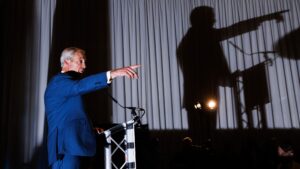Advance warning, this is an opinion on politics. Just so you know, if this upsets you–I don’t care!
Nigel Farage, a name that often conjures up a plethora of emotions, none of them particularly pleasant for many. Let’s be brutally honest here: Farage represents a brand of politics that is, at its core, divisive and regressive. This isn’t a matter of personal dislike, though there’s plenty of that too. It’s a matter of principle, of fundamental human decency and respect for the rights of others. Farage has built his career on a platform of exclusion and fear, a far cry from the values that many of us hold dear.
Now, you might wonder why someone like Farage garners any support at all. It’s a perplexing phenomenon, almost like a bad joke that’s gone on for far too long. His rhetoric is steeped in racism and misogyny, and he has an uncanny knack for aligning himself with similarly odious figures, such as Donald Trump. These alliances are not just troubling; they are indicative of a larger, more insidious agenda. An agenda that seeks to undermine the very fabric of our society by attacking the most vulnerable among us.
A while back, Farage made headlines with his typical vitriol in the EU Parliament, calling for the repeal of the Human Rights Act. His argument? That it would give the country the power to remove dangerous criminals from its shores. This is classic Farage: oversimplify a complex issue, inject a heavy dose of fear, and present a solution that does more harm than good. His comments were largely ignored at the time, dismissed as the ramblings of a man desperate to stay relevant. But now, as he eyes a potential position of power within the UK government, these ideas are resurfacing with a vengeance.
The Human Rights Act, which came into force in 2000, is a cornerstone of modern British law. It enshrines fundamental rights and freedoms, providing a crucial check on government power and ensuring that individuals can challenge public authorities when their rights are violated. Farage’s call to scrap this Act is not just misguided; it’s dangerous. It’s a direct attack on the principles of justice and equality that underpin our society.
It’s important to clarify a common misconception here: the European Convention on Human Rights (ECHR) and the Human Rights Act are not the same thing, nor are they EU laws. The ECHR is an agreement among 47 countries, aimed at protecting human rights, democracy, and the rule of law. It’s overseen by the European Court of Human Rights in Strasbourg, an institution entirely separate from the European Union. Farage’s confusion or deliberate conflation of these entities is either a testament to his ignorance or a cynical attempt to mislead the public.
Let’s take a moment to imagine a world where Farage gets his way. He manages to repeal the Human Rights Act and sever ties with the ECHR. What then? Initially, it might be the refugees and immigrants who bear the brunt of this action, as Farage’s rhetoric often targets them. But this slippery slope doesn’t stop there. Once the protections are dismantled, who’s next? The LGBTQ+ community? Women seeking safe and legal abortions? Anyone who doesn’t fit Farage’s narrow, bigoted view of who deserves to live in this ‘green and pleasant land’?
Farage and Trump are two sides of the same rotten coin. They thrive on division, preying on fears and stoking hatred. Neither has shown any real commitment to the values of democracy, inclusivity, or human rights. Their popularity is a testament to the failings of the current political landscape, where sensationalism often trumps substance, and fear-mongering is a shortcut to power.
There is a certain irony in Farage’s political ambitions. He may have visions of grandeur, dreaming of a time when he leads the nation. But the reality is likely far less glamorous. The more he pushes his regressive agenda, the more he alienates himself from the majority of decent, rational people who see through his charade. Farage might be able to rile up a crowd with his inflammatory speeches, but he’s far from securing a lasting legacy.
In the grand scheme of things, Farage is a temporary annoyance, a loud, obnoxious voice that will eventually fade into the background. The real task for the rest of us is to ensure that his influence remains as limited as possible. By standing up for human rights, promoting inclusivity, and challenging bigotry wherever we see it, we can consign Farage and his ilk to the dustbin of history, where they belong.
In the end, Farage will be remembered not for any significant achievements, but for the damage he attempted to inflict on the very fabric of our society. His name will be synonymous with a dark period in British politics, a time when fear and hatred were given a platform. But as history has shown time and again, such figures are eventually cast aside, their legacies reduced to cautionary tales of what happens when we let our worst instincts guide us.
So here’s to a future where leaders are chosen for their ability to unite, to uplift, and to protect the rights of all people. Here’s to a future where Farage’s brand of politics is nothing more than a bad memory, a reminder of how far we’ve come and how much further we can go.
For now, he can keep on practicing that hand signal. By jove, he has nearly got it.














